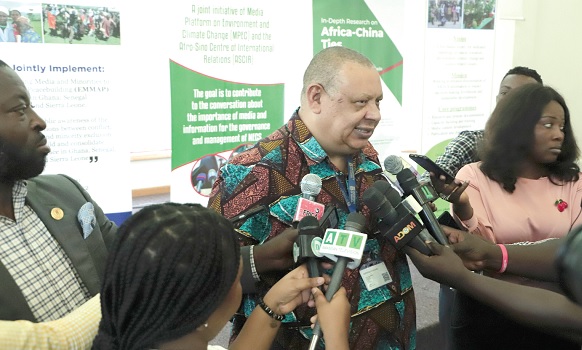
Set agenda on natural resource management - Prof. Gordon to media
The media have been urged to set an agenda on good natural resource exploration practices and environmental protection.
A former Executive Director of the Institute of Environment and Sanitation Studies (IES) at the University of Ghana, Prof. Chris Gordon, said setting an agenda based on facts and evidence would ensure the implementation of policies that would promote the sustainable exploitation of natural resources in the country.
"The governance of natural resources should be done in a manner that ensures sustainable development.
If we indiscriminately destroy our environment in the exploitation of natural resources, we cannot bring it back to equilibrium.
"This is why we need a proactive media that will help to monitor the government, industry and other stakeholders in the natural resource management sector," he added.
Prof. Gordon was speaking at a maiden biennial conference on natural resource, environment and climate change organised by Media Platform for Environment and Climate Change (MPEC), a CSO, in partnership with Afro-Sino Centre for International Relations (ASCIR) and The Steminist Foundation Ghana in Accra yesterday.
About organisation
The organisation is an initiative of a group of journalists and other professionals aimed at addressing the communication gap in science, environment and natural resource governance issues.
Established in 2015, MPEC has the ultimate goal of enhancing public awareness about science, environment and natural resources governance and the impact of those sectors on populations, including migrants.
Participants included representatives from academia, civil society organisations (CSOs) as well as state and non-state institutions.
They were from the Environmental Protection Agency, University of Media, Arts and Communication — Ghana Institute of Journalism (UniMAC-GIJ), journalists in the Water, Sanitation and Health (WASH) sector and the representative from the Zimbabwe Environmental Law Association (ZELA) as well as the Media for Environment, Health and Agriculture (MESHA), a Kenya-based organisation.
Significance
Prof. Gordon said given the important role natural resources played in national development and the survival of humanity, it was important for journalists to give special attention to that sector.
He, however, said that would require journalists learning and acquiring in-depth knowledge of issues relating to the environment and climate change which had direct impact on natural resources.
“The media ought to be that megaphone that amplifies low voices and environmental challenges so that policy can be used to address them,” the former director added.
He also underscored the need for the media and other stakeholders to work together to push the African voice and proffer “an African solution to our environmental problems”.
Prof. Gordon further said that in an era where social media had taken over the social discourse, it was important for journalists to rise to the occasion by putting natural resource management issues on their priority list.
Collaboration
The Director-General of the Ghana-India Kofi Annan Centre of Excellence in ICT (AITI-KACE), Dr Collins Yeboah-Afari, called for stronger collaboration among stakeholders in the natural resource sector to help address the gaps in the industry.
He also said that given the crucial role media played in mobilising stakeholders, it was important to strengthen ties between journalists and other actors in the natural resource and environment sector to help deal with inherent challenges in the industry.
During a panel discussion, the Regional Page Editor of the Daily Graphic, Edmund Smith Asante, called on media training institutions to encourage journalists to develop an interest in environmental reporting, while urging journalists to make stories about the sector more appealing to readers.
Award scheme
The Executive Director of MPEC, Ama Kudom Agyeman, said her outfit, together with its partners, had instituted an award scheme to recognise efforts of media persons, institutions and initiatives whose work focused on science innovation, sustainable natural resources management and climate change, among other initiatives.
